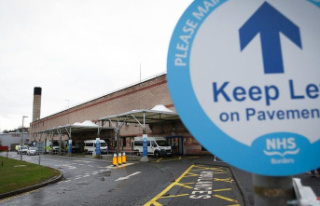Sue Stenton was informed by her GP that she would need hip surgery on the NHS in at least two-and a half years. She decided to go private and use her savings.
Sue stated that the pain had impacted every aspect of her daily life for two years prior to her December hip surgery.
Burntisland, Fife's 61-year old mother said that she couldn't walk more than 10 steps and struggled to move around her house.
She said, "I decided that I couldn't continue like this for years."
"Being constantly in pain was depressing. Not being able to exercise made me gain weight, which affected my mental well-being."
Sue approached a private company and was recommended to have a hip replacement within two months because of the severe arthritis in her right hip. The procedure cost her PS14,000.600
She said, "It is wrong I believed that this was my only option."
"I am fully aware of the impact the pandemic had on the NHS. However, I feel that this is being used to justify the delay in treatment."
The NHS has seen an increase in people who are waiting longer to have their operations after the Covid pandemic.
Some patients are left with little or no financial options and have to look at other options.
One Scottish health board recently conducted a survey of patients on its waiting lists for orthopaedics and discovered that around 30% were thinking about going private.
Consultant surgeon Alastair Murray was chairman of the Scottish Committee of Orthopaedics and Trauma and said that this was a "reasonable reflection of what surgeons across the country were seeing."
According to the Scottish government, it is working with NHS boards to eliminate excessively long waiting times for operations. The Scottish government also pointed out four new national treatment centers that will open in the next year as an example.
More than 553,000 people were still waiting to be treated as inpatients or outpatients at the end March. This is equivalent to one in 10 of the entire population.
Since statistics have been updated in their current form approximately a decade ago, the waiting list is at its highest.
Doctors say it will take many years for the waiting times to return to 2019 levels.
Murray stated that the fact that some people are considering going private to have surgery "reflects the despair many patients feel".
He stated that the "orthopaedic doctors in Scotland don't want to see patients who need private treatment. They are committed to providing as much capacity within the NHS as possible."
"Provision of equal access for timely and high-quality treatment is a shared goal."
Murray expressed concern about the potential impact of orthopaedic surgery on patients who are still waiting.
He stated, "What is less obvious, but just as serious, is that there is an enormous demand for essential, planned treatments such as hip replacements.
"These people are rapidly deteriorating in their community, unable care for dependents, work, or manage their pain.
A spokeswoman for the Scottish government stated that they were working with the NHS boards to eliminate excessively long waiting times, which have been undoubtedly exacerbated due to the effects of the global pandemic.
"We published a NHS Recovery Plan that outlines our plans for social and health care in the next five-years. The plan, which is supported by more than PS1bn in funding, will support outpatient, day, and inpatient activities and allow for the development of sustainable improvements as well as new models of care.
"This includes the National Treatment Centre Programme which will provide capacity for ring-fenced elective activities. In the next year, four centres will be opened in NHS Fife and NHS Highland, NHS Forth Valley, and NHS Golden Jubilee. They specialize in orthopaedics including hip and knee surgeries.












